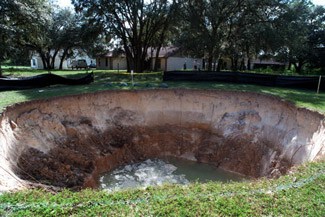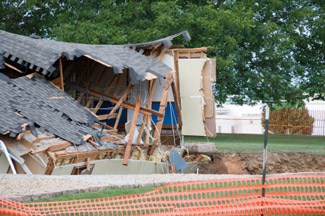Sinkholes & Home Insurance Coverage
Cracks in walls and floors. Slumping fenceposts, foundations and trees. Wilting vegetation. Formation of small ponds. These are all signs that you might have sinkhole damage at your home.
In Florida, which has more sinkholes than any other state, state officials have witnessed a spike in “frivolous” property insurance claims for sinkhole damage — claims that have pumped up premiums for many insurance consumers in the Sunshine State.

The Florida saga has shed light across on the country on the issue of sinkholes and insurance. However, most homeowners across the country aren’t even covered for sinkhole damage.
Florida Gov. Rick Scott signed legislation that’s partly designed to close a loophole that prompted the state’s surge in questionable sinkhole claims. Sinkhole claims cost Florida property insurers $1.4 billion, according to a report from the Florida Office of Insurance Regulation. In Florida, the number of sinkhole claims jumped 184 percent.
If you live in a state where sinkholes are more common, then you will experience a higher cost for coverage. If you live in a county that has experienced sinkhole damage often than you can expect to pay around $2,000 more a year in sinkhole insurance. This additional insurance premium is more expensive than the average homeowner policy.
Which States are Most Common for Sinkholes?
Florida isn’t the only state where homeowners need to keep an eye out for sinkholes, though. According to the U.S. Geological Survey, here are the seven states that experience the most damage from sinkholes:
- Florida
- Texas
- Alabama
- Missouri
- Kentucky
- Tennessee
- Pennsylvania
Whether you’re in Florida or another state, there are many things to consider when it comes to sinkholes and insurance.
4 Things to Consider about Home Insurance and Sinkholes
1. What is a sinkhole?
Sinkholes are depressions or holes in the land surface, formed by the movement of rock or sediment into voids created by the dissolving of water-soluble rock. Sinkholes can be shallow or deep, small or large. Conditions that contribute to development of sinkholes are low water levels, lack of rainfall or even excessive rainfall over short periods, according to researchers.
2. Does my home insurance cover sinkhole damage?
Nationwide, property insurance policies typically exclude coverage for earth movement, such as sinkholes, according to the Florida Senate Banking and Insurance Committee. Lynne McChristian, the Insurance Information Institute’s representative in Florida, points out that home insurance policies were never designed to cover what goes on below ground, such as a sinkhole. It’s meant to cover the structure and contents.
The Pennsylvania Department of Conservation and Natural Resources recommends you check the insurance policy for your home or other property to determine whether it includes sinkhole coverage.
“Finding out after the fact that your house is not covered by your insurance for damages attributed to (a sinkhole) is a hard lesson to learn,” the department says.
Since 1981, insurers in Florida home insurance companies have been required to offer coverage for sinkhole damage, at an additional cost.
In most states, sinkholes are not covered by homeowner’s insurance policies from State Farm, the No. 1 home insurer in the country. “Damage from them is specifically excluded,” spokesman Kip Diggs says.
Diggs says State Farm offers coverage for damage from sinkholes in only three states — Alabama, Florida and Pennsylvania.
Spokesman Luis Sahagun says homeowner’s insurance policies written by Farmers Insurance cover sinkhole damage in only two states: Florida and Tennessee.
3. What should I do if I sinkhole shows up on my property?
If a sinkhole opens up on your property, it’s recommended that you contact your insurance company. In the case of extensive damage, notify your county’s emergency management office. If you’re not sure whether you have a sinkhole, contact a private contractor for an evaluation.
If you’re covered for sinkhole damage, expect your insurance company to order a geological report to determine the cause of the damage to your property. If it is a sinkhole, the insurer typically pays for testing and repairs (minus your deductible). McChristian says testing of a suspected sinkhole costs $8,000 to $12,000.
If there is sinkhole damage, experts may need to pour cement to bolster your home’s foundation.

4. Will what has occurred in Florida happen in other states?
That’s highly unlikely. Except in Florida, sinkhole claims haven’t been a big issue.
“We have not had an abundance of sinkhole incidences in Texas,” says Jerry Johns, spokesman for the Southwest Insurance Information Service.
Johns adds: “If it becomes an issue, it’s going to vary from insurance company to insurance company. Each company will view that type of loss on an individual basis.”
In Florida, one way the new state law will cut down on frivolous sinkhole claims is by clearly defining what constitutes structural damage caused by sinkholes, says Lynne McChristian, the Insurance Information Institute’s representative in Florida. Previous state law lacked any criteria regarding sinkhole-related structural damage, meaning many questionable sinkhole claims got paid. For instance, many Florida sinkhole claims involving cracks in foundations, driveways, walls and ceilings have been paid, even though the damage actually was triggered by the natural settling of the ground below a home. One complication: It’s difficult to prove such damage is caused by a sinkhole.
Only 1 percent of Florida sinkholes create major property damage, McChristian says. Florida officials can’t point to any geological reason for the increase in sinkhole claims.
In recent years, more than three-fourths of Florida policyholders didn’t repair any property damage after getting a sinkhole claim payment, according to a report from the state Senate Banking and Insurance Committee report.
Because the old Florida law didn’t require homeowners to repair sinkhole damage after obtaining claim dollars, some people realized they could just “take the money and run,” McChristian says.
How much home damage does a sinkhole cause?
All homeowners and business owners who own property in sinkhole prone areas should consider whether they have enough insurance to cover the resulting damage, says Joshua Goodman, a member of the sinkhole task force for law firm Cozen O’Connor.
While there’s no clear way to predict whether a sinkhole will occur on your property, you can find out if you live in a sinkhole-prone area by checking with the USGS, or state geological surveys – organizations that collect geological information about each state.
If a sinkhole should occur on your property, it can cause a range of damage from minor cracking in walls to the destruction of entire structures.
The amount of any sinkhole insurance claim is directly related to the severity of the damage, which can vary from a few thousand to millions of dollars, Goodman says. For example, in the state of Florida, sinkhole claims cost insurers about $1.4 billion over a 4 year period Goodman points out. The average claim was about $56,000 — –“a significant amount for…property owners,” Goodman adds.
Your best defense against the cost of natural disasters is to find affordable insurance policies online.
